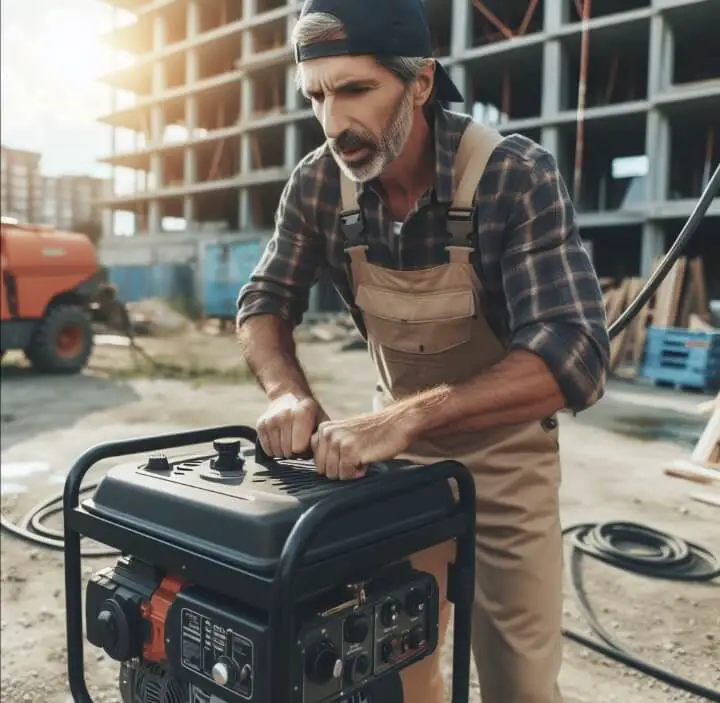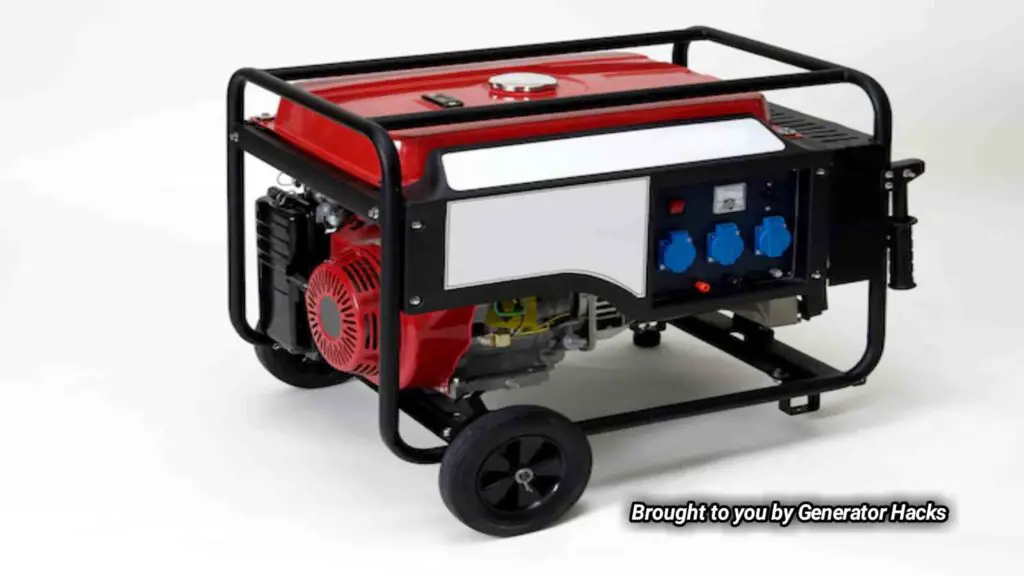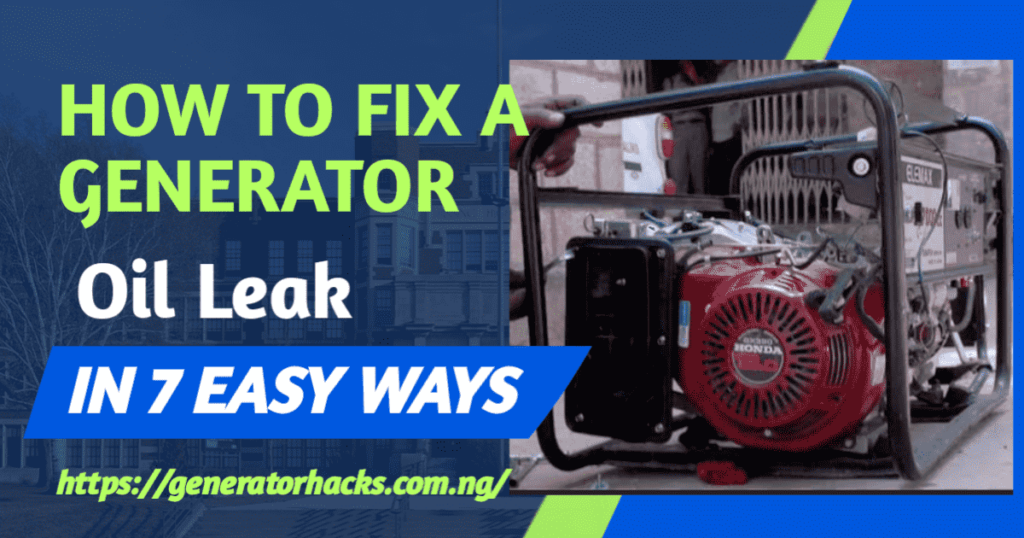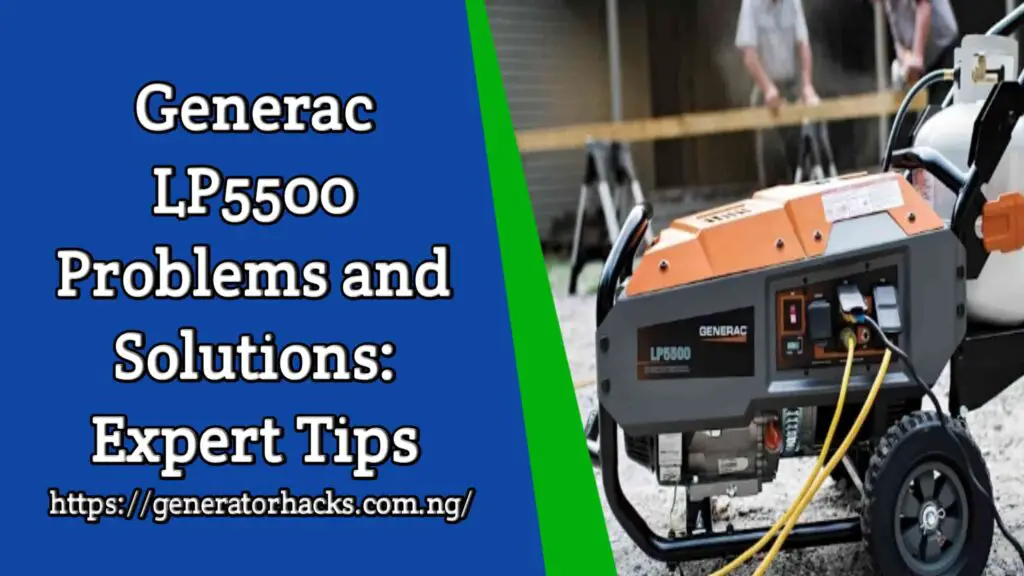As an Amazon Associate, we earn from qualifying purchases. This does not affect the price you pay or the quality of the products you buy. For more information, please read the full affiliate disclosure here.
Have you ever been startled by a loud and strange noise coming from your generator? Maybe it sounded like a revving engine, a popping firework, grinding metal, or a chattering machine. If so, you are not alone. Many generator owners face this problem at some point, and it can be very frustrating and worrisome.
A generator making weird noises is not only annoying but also potentially dangerous. It could indicate a serious issue with your generator that could affect its performance, efficiency, and safety. It could also damage your appliances, cause a fire, or harm your hearing.
That’s why it’s important to understand what causes a generator to make a weird noise and how to fix it. In this blog post, we will explore some of the common types of noise that generators make and what they mean. We will also share some easy and effective solutions that you can try to solve the noise problem and enjoy the benefits of your generator without any hassle.
So, if you want to learn how to troubleshoot and resolve the noise issues with your generator, keep reading. You will discover some valuable tips and tricks that will save you time, money, and headaches. Let’s get started!
Factors Contributing to Your Generator Making Weird Noise?

You know how annoying it can be when your generator starts making weird noises that disturb your peace or, worse, indicate a serious problem.
Generator noise can be caused by a variety of factors, such as:
- Loose or worn-out components that rattle, squeak, or grind.
- Improper lubrication or maintenance that causes friction, overheating, or corrosion.
- Bad or contaminated fuel that clogs, leaks, or burns inefficiently.
- Incorrect air-fuel mixture that causes backfiring, popping, or knocking.
- Faulty or damaged capacitors, regulators, solenoids, or other components that malfunction or short-circuit.
- Vibrations from the surface or the environment amplify or resonate the noise.
These factors can affect the performance, efficiency, and safety of your generator. Therefore, it is important to identify the source and the type of noise and take appropriate actions to fix it.
Recommended Articles:- Generator Repair Cost Estimation: How Much Does it Cost to Repair Generator?
How to Identify the Source of the Noise
The first step to fixing your generator noise problem is to find out where it is coming from and what is causing it. Here are some tips to help you do that:
1: Listen carefully to the noise and try to describe it.
Is it loud or soft, high-pitched or low-pitched, constant or intermittent, rhythmic or random? Different types of noise can indicate different types of problems. For example, a loud, high-pitched, constant noise could mean a loose or broken belt, while a soft, low-pitched, intermittent noise could mean a dirty or clogged air filter.
2: Inspect the generator visually and physically.
Look for any signs of damage, wear, or leakage on the exterior and interior of your generator. Feel for any loose or hot parts that may need tightening or cooling. Smell for any unusual odors that may indicate burning or leaking. Be careful not to touch any live wires or moving parts that may cause electric shock or injury.
3: Use a stethoscope or a screwdriver to pinpoint the noise.
A stethoscope is a device that amplifies sound and allows you to listen to specific parts of your generator. A screwdriver can also work as a makeshift stethoscope by placing the tip on the part you want to listen to and the handle on your ear. This way, you can isolate the noise and locate the exact component that is making it.
The Different Types of Generator Weird Sounds and Solutions
All generators don’t make the same sound. Different factors might bring out a different sound; therefore, it’s important that you know how to identify these sounds. Here are the various sounds you will experience from your generator.
1: Revving Noise
A revving noise is a loud and high-pitched sound that occurs when the engine speed changes rapidly. This can happen when the generator is starting, stopping, or adjusting to the load demand. A revving noise can be caused by:
- A loose or slipping belt or pulley
- A faulty or dirty throttle or governor
- A clogged or dirty air filter or carburetor
- A low or uneven fuel level or pressure
2: Popping Noise
A popping noise is a sharp and intermittent sound that occurs when the fuel combusts irregularly in the engine. This can happen when the fuel quality is poor, the air-fuel mixture is lean, or the spark plugs are dirty or faulty. A popping noise can be caused by:
- Bad or contaminated fuel
- A clogged or dirty fuel filter or injector
- A faulty or dirty spark plug or ignition coil
- A leaky or damaged exhaust valve or manifold
3: Grinding Noise
A grinding noise is a harsh and continuous sound that occurs when metal parts rub against each other. This can happen when the bearings, gears, or brushes are worn out, damaged, or misaligned. A grinding noise can be caused by:
- A lack of lubrication or maintenance
- A loose or broken component
- A faulty or dirty alternator or starter
- A worn-out or damaged brush or slip ring
4: Chattering Noise
A chattering noise is a rapid and rhythmic sound that occurs when the electrical components switch on and off repeatedly. This can happen when the voltage or frequency is unstable, the load is fluctuating, or the capacitors, regulators, or solenoids are faulty. A chattering noise can be caused by:
- A low or high voltage or frequency
- A loose or corroded electrical connection
- A faulty or dirty capacitor, regulator, or solenoid
- A mismatched or overloaded load
How to Fix the Generator Weird Noise Problem
Once you have identified the source, type, and cause of the noise, you can proceed to fix it. Depending on the severity and complexity of the problem, you may be able to do it yourself or you may need to hire a professional.
Here are some possible solutions for common noise problems. (Note: This is a general guide for fixing a generator making weird noise. If you want a personalized guide depending on the noise of your generator, you can comment below or contact us).
1: Tighten or replace any loose or worn-out components, such as belts, bolts, nuts, screws, bearings, washers, or springs. This will prevent them from rattling, squeaking, or grinding and reduce the noise level.
2: Lubricate or maintain your generator regularly, according to the manufacturer’s recommendations. This will prevent friction, overheating, or corrosion and extend the life of your generator. Use the right type and amount of oil, fuel, and coolant for your generator. Change or clean the oil, fuel, and air filters as needed. Check and replace the spark plugs, wires, and batteries if necessary.
3: Use good-quality, fresh fuel for your generator. This will prevent clogging, leaking, or burning inefficiently and improve the performance and efficiency of your generator. Avoid using old, stale, or contaminated fuel that may contain water, dirt, or debris. Use a fuel stabilizer or additive to prevent oxidation or degradation of the fuel. Drain or siphon the fuel tank and lines if you are not using your generator for a long time.
4: Adjust the air-fuel mixture to the optimal ratio for your generator. This will prevent backfiring, popping, or knocking and ensure smooth and steady combustion. Use a carburetor or a fuel injection system to regulate the amount of air and fuel that enters the engine. Use a gauge or meter to measure the air-fuel ratio and adjust it accordingly.
5: Repair or replace any faulty or damaged capacitors, regulators, solenoids, or other components that malfunction or short-circuit. This will prevent electrical noise and interference, and it will protect your generator and your appliances from power surges or fluctuations. Use a multimeter or a tester to check the voltage, current, and resistance of the components and identify any defects or faults. Use the right type and size of fuses, breakers, or switches for your generator.
6: Reduce the vibrations from the surface or the environment that amplify or resonate the noise. This will prevent noise pollution and disturbance for you and your neighbors. Use a rubber mat, a foam pad, or a wooden board to cushion the base of your generator and absorb the vibrations. Use a soundproof enclosure, a muffler, or a silencer to cover the generator and dampen the noise. Use a remote start or a timer to control the generator, and avoid running it at night or during quiet hours.
Recommended Read:- 12 Common Generator Repairs You Must Know
Frequently Asked Questions
Some frequently asked questions about generators making weird noises are:
1: Why does my generator make a lot of noise?
The noise level of your generator depends on the construction, the engine, the exhaust system, and the load demand. Some generators are designed to be quieter than others, but you can also reduce the noise by following some tips and tricks outlined in this blog post.
2: How can I make my generator quieter?
There are several ways to make your generator quieter, such as positioning the exhaust pipe away from your home, mounting the generator on a soft pad or using anti-vibration mounts, reducing the noise by ensuring there’s an air gap, changing the generator’s location, adding a noise muffler, using water as a muffler, using sound deflectors, and reducing vibration in the engine housing.
4: What are the common types of noises that generators make and how do you fix them?
Some of the common types of noises that generators make are revving, popping, grinding, and chattering. Each of these noises has different causes and solutions.
Final Words
In this blog post, we have discussed some of the common causes and solutions for generators making weird noises, such as revving, popping, grinding, or chattering. We hope that this information will help you troubleshoot and resolve the noise issues with your generator and enjoy its benefits without any hassle. If you have any questions or comments, please feel free to leave them below.
Share


